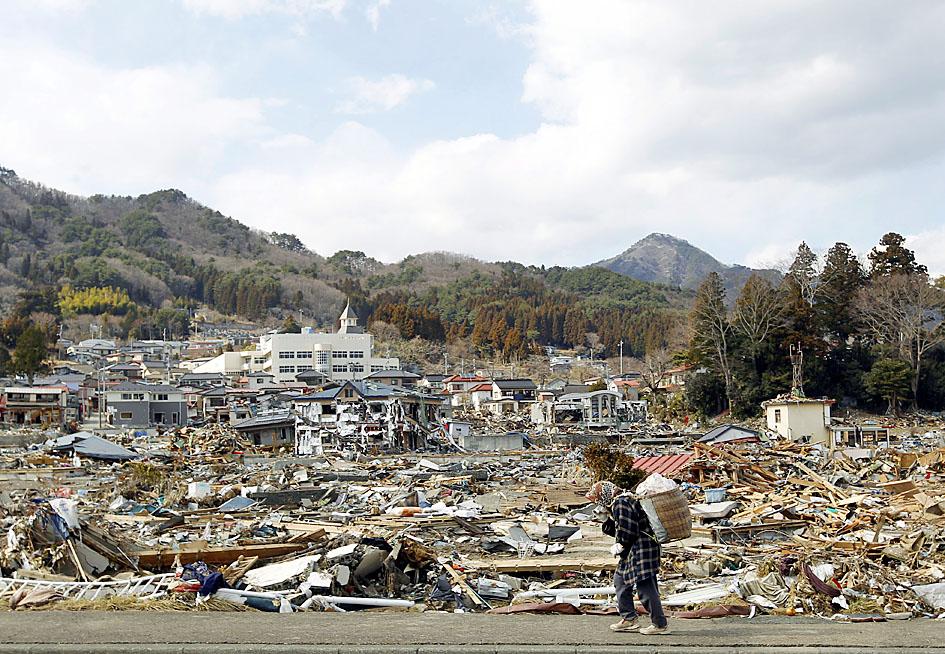A team of Taiwanese experts are to travel to Japan to examine Tokyo’s plans to release contaminated water from the disabled Fukushima Dai-ichi nuclear power plant into the ocean, the Atomic Energy Council said on Monday.
The team would likely make the trip by the end of this year, council Minister Hsieh Shou-shing (謝曉星) said, adding that Tokyo has agreed to the trip in principle.
The team is similar to an investigative task force led by the International Atomic Energy Agency (IAEA) that would also investigate Japan’s plans, Hsieh told reporters after briefing lawmakers on the matter at the Legislative Yuan.

Photo: EPA
IAEA officials have the authority to enter the power plant’s premises to inspect the work being conducted there, and the Taiwanese team would carry out an on-site inspection covering the same items on the IAEA’s itinerary, including water release information and monitoring measures, Hsieh said.
Some IAEA representatives have already visited Japan and the agency plans to send its investigative team by the end of the year, he added.
The council has been coordinating with the Ministry of Foreign Affairs and Taiwan’s representative office in Japan to negotiate the planned visit with Japanese officials, he said.
Japan has announced that it would release more than 1 million tonnes of contaminated water from the crippled power plant into the sea, beginning in about two years.
Tokyo Electric Power Co, which operates the plant, would treat and dilute the contaminated water before discharging it, Japan said.
The filtering process would remove most radioactive elements from the water, leaving only tritium, news media have reported.
The IAEA has come up with a timetable for procedures and measures regarding the release of the water, and the council would map out its plan in line with the IAEA’s timetable, despite Taiwan not being included in the UN agency’s investigative task force, Hsieh said.
Taiwan has banned food imports from five Japanese prefectures — Fukushima, Ibaraki, Tochigi, Gunma and Chiba — since the Fukushima Dai-ichi nuclear disaster on March 11, 2011.
Since the disaster, it has also subjected nine categories of Japanese food products from other parts of Japan to batch-by-batch border inspections for radioactive residue.
About 175,000 items have since been tested, government data showed.
Asked by a lawmaker whether Taiwan has enough capacity to increase tests for radioactive residue if it resumes food product imports from the five prefectures, Hsieh said that the nation’s testing capacity outstrips annual demand by about three times.
Preparations for resuming imports have been made over the past few years, he said.
The government is considering lifting the ban following its application to join the Japan-led Comprehensive and Progressive Agreement for Trans-Pacific Partnership, one of the world’s biggest trade blocs.
The bloc represents a market of 500 million people and accounts for 13.5 percent of global trade.

An essay competition jointly organized by a local writing society and a publisher affiliated with the Chinese Communist Party (CCP) might have contravened the Act Governing Relations Between the People of the Taiwan Area and the Mainland Area (臺灣地區與大陸地區人民關係條例), the Mainland Affairs Council (MAC) said on Thursday. “In this case, the partner organization is clearly an agency under the CCP’s Fujian Provincial Committee,” MAC Deputy Minister and spokesperson Liang Wen-chieh (梁文傑) said at a news briefing in Taipei. “It also involves bringing Taiwanese students to China with all-expenses-paid arrangements to attend award ceremonies and camps,” Liang said. Those two “characteristics” are typically sufficient

A magnitude 5.9 earthquake that struck about 33km off the coast of Hualien City was the "main shock" in a series of quakes in the area, with aftershocks expected over the next three days, the Central Weather Administration (CWA) said yesterday. Prior to the magnitude 5.9 quake shaking most of Taiwan at 6:53pm yesterday, six other earthquakes stronger than a magnitude of 4, starting with a magnitude 5.5 quake at 6:09pm, occurred in the area. CWA Seismological Center Director Wu Chien-fu (吳健富) confirmed that the quakes were all part of the same series and that the magnitude 5.5 temblor was

The brilliant blue waters, thick foliage and bucolic atmosphere on this seemingly idyllic archipelago deep in the Pacific Ocean belie the key role it now plays in a titanic geopolitical struggle. Palau is again on the front line as China, and the US and its allies prepare their forces in an intensifying contest for control over the Asia-Pacific region. The democratic nation of just 17,000 people hosts US-controlled airstrips and soon-to-be-completed radar installations that the US military describes as “critical” to monitoring vast swathes of water and airspace. It is also a key piece of the second island chain, a string of

The Central Weather Administration has issued a heat alert for southeastern Taiwan, warning of temperatures as high as 36°C today, while alerting some coastal areas of strong winds later in the day. Kaohsiung’s Neimen District (內門) and Pingtung County’s Neipu Township (內埔) are under an orange heat alert, which warns of temperatures as high as 36°C for three consecutive days, the CWA said, citing southwest winds. The heat would also extend to Tainan’s Nansi (楠西) and Yujing (玉井) districts, as well as Pingtung’s Gaoshu (高樹), Yanpu (鹽埔) and Majia (瑪家) townships, it said, forecasting highs of up to 36°C in those areas